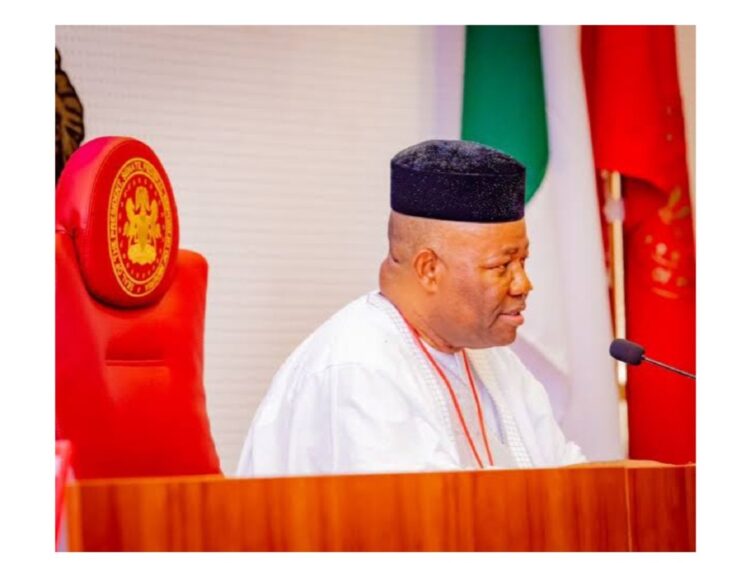Senate President Akpabio has gotten a fresh ultimatum to recall Ningi.
NewsOnline Nigeria reports that the Socio-Economic Rights and Accountability Project (SERAP) has urged the Senate President, Godswill Akpabio, to recall Senator Abdul Ningi who was suspended for three months over his allegation of budget padding.
This Nigeria news platform understands that Ningi, the lawmaker representing Bauchi Central, was suspended for three months over an interview in which he alleged that the National Assembly padded the 2024 N28.7 trillion budget as against N25tn.
ALSO: Tinubu Speaks on the Barbaric Murder Of Military Officers By Delta Youths
He was quoted as saying, “For the first time in Nigerian history, today we are operating two different budgets. One budget was approved by the National Assembly and signed by President Bola Tinubu, and the one was implemented by the presidency.
“The one approved by us is N25tn while the one operating by the Federal Government is N28tn.”
Two days after his resignation as the Chairman of the Northern Senators’ Forum, Ningi was replaced by Senator Abdulaziz Yar’Adua (APC Katsina Central).
In a statement dated March 16, 2024, and made available to PUNCH Online on Sunday, March 17; and signed by SERAP Deputy Director, Kolawole Oluwadare, the group urged Akpabio “to immediately reinstate whistleblower Abdul Ningi who was recently suspended from the Senate over his allegations that the lawmakers padded the 2024 budget by irregularly inserting projects worth N3.7 trillion.”
SERAP equally told the Senate President to refer the allegation to the country’s anti-graft agencies – the Economic and Financial Crimes Commission, and the Independent Corrupt Practices and Other Related Crimes Commission, which would improve public trust in the Senate.
The statement asked that Akpabio should “urgently refer the allegations that lawmakers padded the 2024 budget by irregularly inserting projects worth N3.7 trillion to appropriate anti-corruption agencies for investigation and prosecution.
“Referring these allegations to appropriate anticorruption agencies would be consistent with the lawmakers’ oath of office and the letter and spirit of the Nigerian Constitution 1999 (as amended).”
Bauchi State Governor, Bala Mohammed, on Monday, expressed full support for Ningi during the State Executive Council meeting, saying, “I made it clear that I stand firm in our support for Senator Abdul Ahmed Ningi, of Bauchi Central.”
Meanwhile, SERAP followed suit, saying, “What Senator Ningi has done is a positive act of good citizenship. No whistleblower should ever be penalised simply for making a public interest disclosure.”
SERAP also urged Akpabio “to make a public commitment to discontinue the patently unlawful constituency projects in the next budget cycle.”
The statement continued, “Without inside information, corruption is hard to detect, prevent, and combat. Rather than suspending Senator Ningi, the Senate ought to have used his allegations as a trigger for addressing the lingering problem of budget padding and corruption in the implementation of constituency projects.
“Referring the allegations to the Independent Corrupt Practices and Other Related Offences Commission (ICPC) and Economic and Financial Crimes Commission (EFCC) would improve public trust in the ability of the leadership of the Senate to ensure probity and accountability in the budget process.
“We would be grateful if the recommended measures are taken within 7 days of the receipt and/or publication of this letter. If we have not heard from you by then, SERAP shall consider appropriate legal actions to compel you and the Senate to comply with our requests in the public interest.”
The organisation expressed its concern “about the opacity and lack of accountability in the spending of public funds on constituency projects since the return of democracy in 1999.
“SERAP is seriously concerned that years of allegations of budget padding and corruption in the implementation of constituency projects have contributed to widespread poverty, underdevelopment, and lack of access to public goods and services.”














